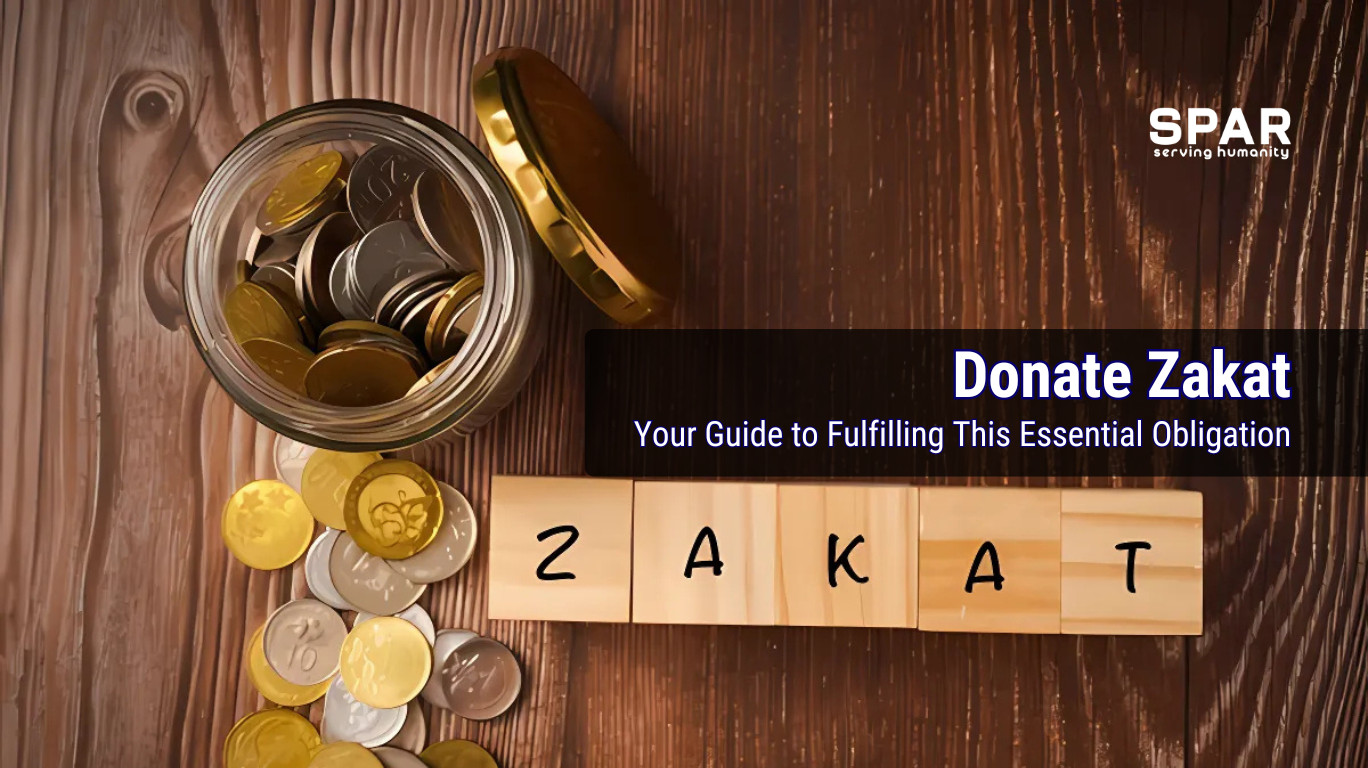How to Donate Zakat: A Complete Guide for Muslims
Zakat is among the Five Pillars of Islam and an essential aspect of every Muslim’s faith. More than just an act of charity, it is a religious duty that cleanses wealth and aids those in difficulty. Muslims must donate a share of their wealth to those who need it but have to adhere to certain guidelines.
In this article, you’ll be guided on how to donate Zakat, who has to give Zakat, and how to calculate it. We will also discuss what to donate during Zakat and how to donate Zakat in the best way so that it reaches the needy and serves its purpose.
What is Zakat?
Zakat—Similar to Sadaqah, Zakat is obligatory charity in Islam. Muslims are required to give a certain percentage of their wealth every year to assist the needy. ‘Zakat’ literally means ‘purification’ in Arabic. Unlike other forms of charity, zakat is a religious obligation for Muslims who have the means to give.
It helps to make sure that wealth does not just get hoarded but instead transferred from those who have enough to those who need it. It fights poverty and promotes equality. When you give Zakat, you make a religious obligation and preserve spiritual reward.
Zakat is one of the fundamental pillars of Islam that is compulsory for every owner of wealth.
Why is Zakat donation so important in Islam?
Here are some of the reasons that makes it so critical:
- Increase in Money: Giving Zakat increases your money as it rids your money of its impurities and excess and blesses it further.
- Welfare: It supports those who are in distress, and it serves them monetary aid.
- Personal Spiritual Growth: Meeting this obligation enhances your spirituality and community connection. It is a remembrance of Allah, a sign of compassion.
One of the main purposes of zakat is to assist in reducing economic inequality, where wealth is transferred from the rich to the poor.
Who is Obligated to Give Zakat?
Not all Muslims must pay Zakat. For Zakat to be obligatory, there are some prerequisites.
1. Wealth Above Nisab Limit: You should have wealth beyond a certain limit, which is called the Nisab. However, this is the lowest limit where Zakat becomes mandatory. The amount of wealth one must possess for Zakat, known as Nisab, is approximately worth 85 grams of gold or 595 grams of silver.
2. One Lunar Year Ownership: You only pay Zakat on wealth that you have owned for one complete Islamic year (lunar year). This encompasses cash, gold, silver and investments. Zakat does not apply to wealth which you use day to day, such as your house or your car.
3. Eligibility of Assets: Zakat is applicable to savings, investments, stocks, and other asset-related growth. Some examples of Zakat-able assets are, for example, business assets, personal savings, and gold. That, however, does not include your own home, furniture, and personal belongings.
How Much Zakat to Pay?
Simply put, you need to pay a Zakat of 2.5 percent of your cash wealth that is eligible. This means when your wealth reaches the Nisab, 2.5% of the total value of your wealth should be donated.
Zakat Calculation Example:
| Asset Type | Amount | Zakat (2.5%) |
| Savings | $10,000 | $250 |
| Gold | $5,000 | $125 |
| Stocks | $3,000 | $75 |
| Total | $18,000 | $450 |
In this example, your total wealth is $18,000. Your Zakat obligation would be 2.5% of $18,000, which is $450.
When Should You Donate Zakat?
The time to pay Zakat is after one Hijri year of possessing the wealth. If your wealth has reached the Nisab level for the first time, you have to calculate Zakat from that particular date, pay it once the year is complete.
While some Muslims choose to give their Zakat during the holy month of Ramadan, as it is a blessed month where the reward of good deeds are multiplied. You can donate Zakat anytime within the year, but…
Various Ways on How to Donate Zakat
Zakat can be given in many forms, and it is important to select the mode that serves your beliefs and those in your area.
- Support Individuals: Zakat may also be given to individuals in need, including widows, orphans, and those in debt. It’s crucial to make sure they are qualified to get it.
- Commit Zakat Through Charity Organizations: Most Muslims donate their Zakat through recognizable charities. They have the infrastructure to distribute Zakat to those in need, ensuring that it reaches the hand of the right recipient. They also provide visibility and responsibility.
- Zakat Donations Online: Giving Zakat online has gained much ground nowadays. There are many Islamic organizations out there that offer an online option to donate Zakat easily and securely. It is a faster way to help you to buy off obligation.

Who Can Receive Zakat?
There are certain groups defined in the Quran who are the recipients of Zakat and must accept it:
- The impoverished, also known as Fuqara, are individuals who struggle to meet their basic needs.
- Al-Miskeen: Those with little subsistence on the lowest level
- Indebted (Gharimin): Separated into two groups, one for those who are in debt and are unable to pay it off.
- These are the people who are employed to collect and distribute Zakat.
- Baru masuk Islam (Muallaf): Para mualaf yang pertama kali memeluk agama Islam.
- Freeing Slaves (Riqab) | The freeing of slaves or those wanting to be free.
- Masjid (For the work of Masjid): To be given to fund the imam and others, as well as building the mosque.
- The Traveler (Ibn al-Sabil): A traveler who is stranded or in need of financial assistance (in Arabic, Ibn al-Sabil).
It is very important that you give your Zakat to one of these categories in order for it to be valid.
Zakat vs. Sadaqah: What is the Difference?
Although Zakat and Sadaqah represent forms of charitable giving, there are differences between these two practices:
- Zakat is compulsory, but Sadaqah is optional.
- Zakat is to be given to specific recipients, whereas Sadaqah can be given to any person in need.
- The Zakat calculation has a fixed percentage (2.5%); Sadaqah could also be any amount.
How much Zakat should one have to give?
The act of donating Zakat holds numerous rewards and benefits both in this life and the akhirah:
- Spiritual Benefits of Giving Zakat: Fulfilling the Zakat obligation leads to the purification of your wealth and to rewards from Allah.
- Social Welfare: Zakat enhances the living standards of the needy and minimizes poverty.
- Richness Increments: Giving Zakat is, in fact, thought to be a reason for illustrious increments in wealth. It takes the impurities out of your riches and beckons more wealth to you.
Zakat promotes mutual camaraderie and social solidarity, making the community more cohesive.
Is it permissible to give the Zakat to my family members?
No, if the recipients are your mother or father, wife, or children who are financially dependent on you, you cannot give Zakat to them. But, Sadaqah can be donated to them.
Can I give Zakat to an organization?
Yes, you may donate Zakat to an institution or organization that disburses it to rightful persons. Confirm that the organization is legitimate and going through the proper channels.
Question: Is Zakat payable on my income?
The answer is “No,” Zakat is not obligatory on income until it is kept with you for one complete year and also is above Nestled. It is about the accumulation and retention of wealth.
What if I don’t pay Zakat?
Mess with Zakat or do not pay and face the wrath of Allah, and Allah has said in the Quran that Zakat is a necessary act of worship. But only Allah knows the exact consequences.
Is it possible for me to distribute Zakat in installments?
You can split your Zakat into installments, provided that you will have donated the full amount by the end of the lunar year.
Can Zakat be paid on the assets of the business?
Yes, a business that is owned by an individual and reaches the Nisab amount must pay Zakat on the business assets, inventory, and cash.




 Secure
donation
Secure
donation